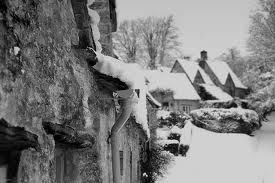Here’s a little more on a late-Victorian Christmas as experienced by the scholar-squire J. Arthur Gibbs, author of A Cotswold Village.
J. Arthur has a strong sense of history, aware that he’s encountering a way of country life that’s rooted not just in place but also in time. Christmas and the end of the old year brings this awareness to the fore:
Yes, Christmas is Christmas still in the heart of old England. We are apt to talk of the good old days that are no more, lamenting the customs and country sports that have passed away; but let us not forget that two hundred years hence, when we who are living now will have long passed “that bourne from which no traveller returns,” our descendants, as they sit round their hearths at Yuletide, may in the same way regret the grand old times when good Victoria – the greatest monarch of all ages – was Queen of England; those times when during the London season fair ladies and gallant men might be seen on Drawing-room days driving down St James’s Street in grand carriages, drawn by magnificent horses, with servants in cocked hats and wigs and gold lace; when the rural villages of merrie England were cheered throughout the dreary winter months by the sound of horse and hound, and by the sight of beautiful ladies and red-coated sportsmen, mounted on blood horses, careering over the country, clearing hedges and ditches of fabulous height and width; when every man, woman, and child in the village turned out to see the “meet,” and the peer and the peasant were for the day on an equal footing, bound together by an extraordinary devotion to the chase of “that little red rover” which men called the fox – now, alas! extinct, as the mammoth or the bear, owing to barbed wire and the abolition of the horse; when to such an extent were games and sports a part of our national life that half London flocked to see two elevens of cricketers (including a champion “nine” feet high called Grace) fighting their mimic battle arrayed in white flannels and curiously coloured caps, at a place called Lords, the exact site of which is now, alas! lost in the sea of houses; when as an absolute fact the first news men turned to on opening their daily papers in the morning was the column devoted to cricket, football, or horse-racing; when in the good old days, before electricity and the motor-car caused the finest specimen of the brute creation to become virtually extinct (although a few may still be seen at the Zoological Gardens), horse-racing for a cup and a small fortune in gold was only second to cricket and football in the estimation of all merrie Englanders – the only races now indulged in being those of flying machines to Mars and back twice a day. Two hundred years hence, I say, the Victorian era – time of blessed peace and unexampled prosperity – will be pronounced by all unprejudiced judges as the true days of merrie England…
Well, we’re over half way to Gibbs’s ‘two hundred year hence’ mark – that is the end of our twenty-first century – and despite expectations (and sometimes the best efforts of our legislators) hunting, cricket and horse-racing persist and might even be said to be flourishing (who can doubt that he would be jubilant about the recent Ashes successes?).
Squire Gibbs is, of course, indulging something of a sentimental view of the world, but it’s nevertheless satisfying to trace some strong and enjoyable continuities with our ancestors of over a hundred years ago. And it’s comforting to note that, whilst we’ve suffered some sad losses, the countryside described by Gibbs continues to delight. Wouldn’t it also be good to hope that ‘Christmas is Christmas still in the heart of old England’? Wherever your ‘heart of old England’ happens to be located, I hope you have a wonderful time.












Lovely post, Gaw. Happy Christmas to you and the Dabbler confraternity – may your seasonal celebrations prove as rich with cheer as Mr Gibbs’ prose is rich in semicolons, subordinate clauses and proleptic nostalgia.
Merry Christmas to you and yours Barendina! Thanks for your contributions.
I think there are a total of three sentences in that extract – with a whopper in the middle. I wonder whether it’s fun to get carried away with a sentence or two? My guess is that Orwell should take the blame for killing the practice off. Perhaps a New Year resolution might be to get all baroque with the odd post…